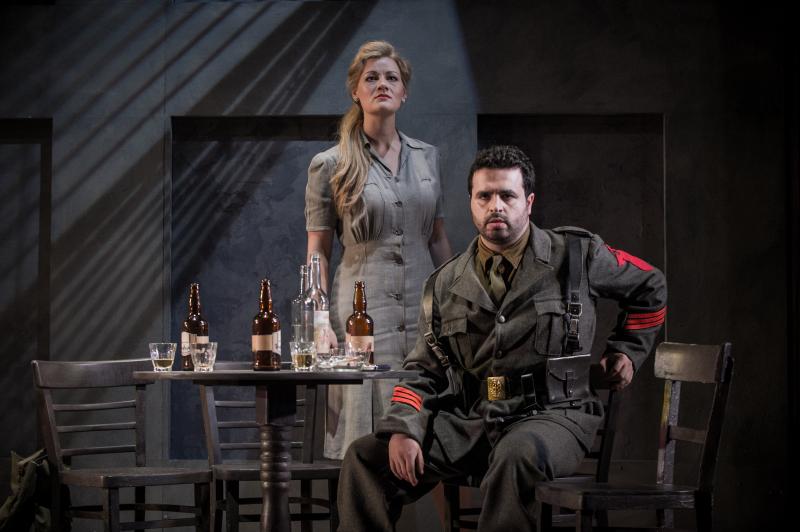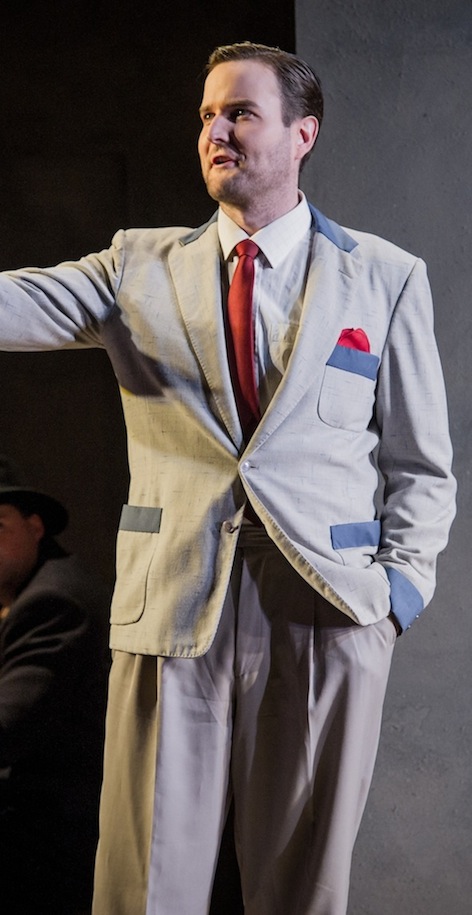Carmen, Mid Wales Opera | reviews, news & interviews
Carmen, Mid Wales Opera
Carmen, Mid Wales Opera
Bizet with Jonathan Miller's small forces makes more impact than the Cardiff version

It’s only a few days since I was remarking, à propos the WNO revival, that Carmen usually survives its interpreters. Now WNO’s humble neighbour, Mid Wales Opera, are proving the same point, but in a more positive spirit, by touring a new production by Jonathan Miller, with a vastly reduced orchestra, a cast of fourteen including chorus, and a set (Nicky Shaw) made up of moveable stagings cleverly lit (by Declan Randall), like some highly simplified Chirico.
The unexpected heroes of the show, as seen and heard in Tewkesbury’s Roses Theatre on Thursday, are the ten-piece band under MWO’s musical director, Nicholas Cleobury, playing the score in an extremely skilful reduction by Stephen McNeff. In the old Carl Rosa days a touring production on this scale would have had piano accompaniment, take it or leave it. But these reduced orchestrations are a very different matter if sensitively done, presenting the music in sketch form perhaps, but with plenty of colour and a kind of sonic vitality that is sometimes absent even from full orchestral performances.
One can get endless pleasure following this novel yet expert ensemble through Bizet’s wonderful musicMcNeff’s band is well chosen: a solo trumpet brandishes the opening melody, a solo cello picks out the fate theme, an alto saxophone adds sensual warmth to the middle registers, a guitarist plucks away like some Andalusian harp. One can get endless pleasure just following this novel yet expert ensemble through Bizet’s wonderful music. And what a relief to hear it conducted with such precision and flexibility after the Cardiff shemozzle! Only briefly in the final act did the lack of real body to the sound restrict the drama to any serious extent. Up to this point the texture and movement were fully equal to the stage narrative.
 Miller’s production (sung in a free English translation by Rory Bremner) is basic and a shade too aware of the limited space in the small-town theatres and cinemas through which the company will thread its way from now until mid-November. For some reason he updates the setting to the 1940s, a drab and ugly time for fashion, in a work that should flaunt costume and colour. And there is little or no sense of southern Spain, no heat, no frenzy, none of that emotional violence that destroys the pure Navarrais in Don José. The movement and choreography are tepid, the fight in Act 3 almost imperceptible. But then Miller’s Carmen, Helen Sherman, is so blond and light-skinned that when the dark, bearded José (Leonel Pinheiro) accuses her of being a gypsy it’s as if the whole production has come out in negative.
Miller’s production (sung in a free English translation by Rory Bremner) is basic and a shade too aware of the limited space in the small-town theatres and cinemas through which the company will thread its way from now until mid-November. For some reason he updates the setting to the 1940s, a drab and ugly time for fashion, in a work that should flaunt costume and colour. And there is little or no sense of southern Spain, no heat, no frenzy, none of that emotional violence that destroys the pure Navarrais in Don José. The movement and choreography are tepid, the fight in Act 3 almost imperceptible. But then Miller’s Carmen, Helen Sherman, is so blond and light-skinned that when the dark, bearded José (Leonel Pinheiro) accuses her of being a gypsy it’s as if the whole production has come out in negative.
The best things in it are intelligent touches in the directing of individual numbers: the card-reading trio (with Daisy Brown and Marta Fontanals-Simmons touchingly bemused by Sherman’s intensity), the toreador’s song, the smugglers’ quintet. But there are musical strengths as well. Sherman herself may not be one of Nature’s Carmens to look at, but she sings the part beautifully, with fine dark colourings in the chest register and plenty of brilliance on top. As Micaëla, Elin Pritchard has to weather an unsuitable gingham frock and bobby socks, sounds inhibited and girlish in Act 1, but blossoms in her big aria, allowing the warmth to flow out. Pinheiro, by contrast, often sounds tight and compressed, which is all right for the character but less so for the music. Nicholas Lester (pictured above right) is a fine, personable Escamillo who knows how to move and how to stand, like any self-respecting toreador.
Cuts are made that one regrets but can understand. Since little boys can’t be toured in school term, their guard-changing chorus goes missing, as – for less obvious reasons – does the Act 2 entr’acte. The dialogue is reduced to a minimum, no great loss, and it shortens the evening manageably for remote areas where footpads still roam the lanes at night and owls turn into witches.
The future of Arts Journalism
You can stop theartsdesk.com closing!
We urgently need financing to survive. Our fundraising drive has thus far raised £49,000 but we need to reach £100,000 or we will be forced to close. Please contribute here: https://gofund.me/c3f6033d
And if you can forward this information to anyone who might assist, we’d be grateful.

Subscribe to theartsdesk.com
Thank you for continuing to read our work on theartsdesk.com. For unlimited access to every article in its entirety, including our archive of more than 15,000 pieces, we're asking for £5 per month or £40 per year. We feel it's a very good deal, and hope you do too.
To take a subscription now simply click here.
And if you're looking for that extra gift for a friend or family member, why not treat them to a theartsdesk.com gift subscription?
more Opera
 La bohème, Opera North review - still young at 32
Love and separation, ecstasy and heartbreak, in masterfully updated Puccini
La bohème, Opera North review - still young at 32
Love and separation, ecstasy and heartbreak, in masterfully updated Puccini
 Albert Herring, English National Opera review - a great comedy with depths fully realised
Britten’s delight was never made for the Coliseum, but it works on its first outing there
Albert Herring, English National Opera review - a great comedy with depths fully realised
Britten’s delight was never made for the Coliseum, but it works on its first outing there
 Carmen, English National Opera review - not quite dangerous
Hopes for Niamh O’Sullivan only partly fulfilled, though much good singing throughout
Carmen, English National Opera review - not quite dangerous
Hopes for Niamh O’Sullivan only partly fulfilled, though much good singing throughout
 Giustino, Linbury Theatre review - a stylish account of a slight opera
Gods, mortals and monsters do battle in Handel's charming drama
Giustino, Linbury Theatre review - a stylish account of a slight opera
Gods, mortals and monsters do battle in Handel's charming drama
 Susanna, Opera North review - hybrid staging of a Handel oratorio
Dance and signing complement outstanding singing in a story of virtue rewarded
Susanna, Opera North review - hybrid staging of a Handel oratorio
Dance and signing complement outstanding singing in a story of virtue rewarded
 Ariodante, Opéra Garnier, Paris review - a blast of Baroque beauty
A near-perfect night at the opera
Ariodante, Opéra Garnier, Paris review - a blast of Baroque beauty
A near-perfect night at the opera
 Cinderella/La Cenerentola, English National Opera review - the truth behind the tinsel
Appealing performances cut through hyperactive stagecraft
Cinderella/La Cenerentola, English National Opera review - the truth behind the tinsel
Appealing performances cut through hyperactive stagecraft
 Tosca, Royal Opera review - Ailyn Pérez steps in as the most vivid of divas
Jakub Hrůša’s multicoloured Puccini last night found a soprano to match
Tosca, Royal Opera review - Ailyn Pérez steps in as the most vivid of divas
Jakub Hrůša’s multicoloured Puccini last night found a soprano to match
 Tosca, Welsh National Opera review - a great company reduced to brilliance
The old warhorse made special by the basics
Tosca, Welsh National Opera review - a great company reduced to brilliance
The old warhorse made special by the basics
 BBC Proms: The Marriage of Figaro, Glyndebourne Festival review - merriment and menace
Strong Proms transfer for a robust and affecting show
BBC Proms: The Marriage of Figaro, Glyndebourne Festival review - merriment and menace
Strong Proms transfer for a robust and affecting show
 BBC Proms: Suor Angelica, LSO, Pappano review - earthly passion, heavenly grief
A Sister to remember blesses Puccini's convent tragedy
BBC Proms: Suor Angelica, LSO, Pappano review - earthly passion, heavenly grief
A Sister to remember blesses Puccini's convent tragedy
 Orpheus and Eurydice, Opera Queensland/SCO, Edinburgh International Festival 2025 review - dazzling, but distracting
Eye-popping acrobatics don’t always assist in Gluck’s quest for operatic truth
Orpheus and Eurydice, Opera Queensland/SCO, Edinburgh International Festival 2025 review - dazzling, but distracting
Eye-popping acrobatics don’t always assist in Gluck’s quest for operatic truth

Add comment